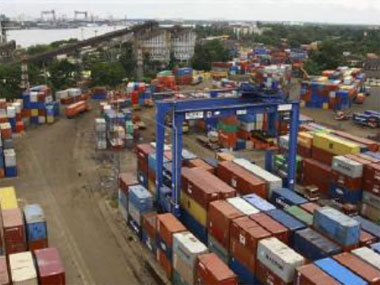New Delhi: India’s exports have entered negative zone after a gap of eight months recording a decline of 9.71 percent to $25.01 billion in June, according to the government data. Imports also declined 9 percent to $40.29 billion in June mainly due to falling prices of petroleum products, leaving a trade deficit of $15.28 billion. It was $16.6 billion in June last year. Last time it was in September 2018, when exports contracted by 2.15 percent. Exports were down on account of fall in shipments of gems and jewellery, engineering goods, petroleum products, plastic, handicrafts, ready-made garments of all textiles, chemicals, leather, and marine products, oil meals and oilseeds. Commenting on the figure, Commerce Secretary Anup Wadhawan said “the decline in exports in June is due in large part to a base effect of an extraordinarily good month in June 2018”. [caption id=“attachment_2451248” align=“alignleft” width=“380”] Representational image. Reuters.[/caption] In June last year, the outbound shipments were $27.7 billion. He said the negative growth is also consistent with certain global trends, which have impacted exports in recent months. The World Bank in its Global Economic Prospects (June 2019) has projected weakening of global trade in 2019, he told reporters. Global trade is projected to grow at 2.6 percent this year, a full percentage point below their previous forecast. Various major economies of the world have also shown negative export growth in recent months. According to the latest WTO data available for April, there is negative growth in Japan (-5.88 percent), European Union (-4.30 percent), China (- 2.75 percent), USA (-2.12 percent). The ministry in a statement said that temporary shutdown of ONGC Mangalore Petrochemical Ltd (from April 17 to June 28) for maintenance has adversely impacted exports of petroleum products. Jamnagar refinery also experienced a routine maintenance-related disruption in June 2019, which is likely to abate by mid-July, it said. Engineering goods have been affected because of a fall in global prices of steel. Oil and non-oil imports declined 13.33 percent to $11 billion and 7.34 percent to $29.26 billion, respectively. Cumulatively, during April-June 2019, exports dipped 1.69 percent to $81 billion, while imports were contracted by 0.29 percent to $127 billion. Trade deficit during the period narrowed to $45 billion, from $46 billion during April-June 2018. Gold imports increased 13 percent to $2.7 billion in June. Further, according to the latest data of the RBI, services exports in May were $18.68 billion, a growth of 15.49 percent. Imports in May grew 22.37 percent to $12.49 billion.
India’s exports have entered negative zone after a gap of eight months recording a decline of 9.71 percent to $25.01 billion in June, according to the government data
Advertisement
End of Article


)

)
)
)
)
)
)
)
)



